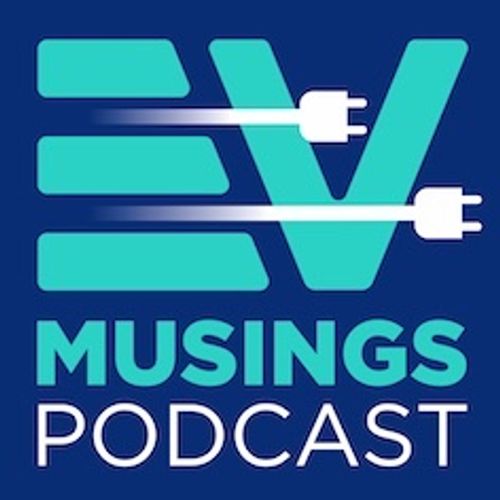Episode 274
274 - The Nudge Episode
In this episode, Gary explores the concept of 'nudges' and how they can be applied to encourage the adoption of electric vehicles and renewable energy.
He discusses examples from behavioral economics, such as rearranging food options to promote healthier choices, and applies these ideas to the EV market.
Gary also examines legislative nudges, like the UK's ZEV mandate, and the role of advertising and peer pressure in normalizing EVs. The episode concludes with practical suggestions for increasing EV uptake, including test drives and tax incentives.
The EV Musings Podcast is sponsored by Zapmap, the go-to app for EV drivers, helping you find and pay for public charging with confidence.
Links in the show notes:
- Nudge on Amazon - Affiliate Link
- Tesco adds 1000th electric van to fleet - electrive.com - Cool thing
- How to promote the EV experience - The EV Musings Podcast
Episode produced by Arran Sheppard at Urban Podcasts: https://www.urbanpodcasts.co.uk
(C) 2019-2026 Gary Comerford
Support me:
Patreon Link: http://www.patreon.com/evmusings
Ko-fi Link: http://www.ko-fi.com/evmusings
The Books:
'So, you've gone electric?' on Amazon : https://www.amazon.co.uk/dp/B07Q5JVF1X
'So, you've gone renewable?’ on Amazon : https://amzn.to/3LXvIck
Social Media:
EVMusings: Twitter https://twitter.com/MusingsEv
Instagram: @EVmusings
Octopus Energy referral code (Click this link to get started) https://share.octopus.energy/neat-star-460
Upgrade to smarter EV driving with a free week's trial of Zapmap Premium, find out more here https://evmusings.com/zapmap-premium
Transcript
Gary: Hi. I'm Gary and this is EV Musings a podcast about renewables, electric vehicles and things that are interesting to electric vehicle owners.
On the show today we'll be looking at nudges.
Our main topic of discussion today is Nudges.
Back in:The basic concept behind the book was that it is often much easier to affect people’s behaviour using simple methods rather than more complex methods.
Two examples: If you want kids at school to choose healthier food options at lunch, rather than changing the menu and taking all the ‘bad’ food off the menu - which is seen as ‘mandating’ food and taking choice away - it’s often easier just to rearrange things. If the French fries are prominently displayed instead of carrot sticks, guess what? Kids choose French fries. Put the desserts at the start of the line instead of the end and guess what? Kids choose more deserts.
The other famous example from this book relates to workplace pensions. In many places in the US pensions are ‘opt-in’ - a person has to physically tick a box on a form to opt in to a specific workplace scheme. Researchers found that many people weren’t doing this and were missing out. By changing the form to ‘opt-out’ rather than ‘opt-in’ the rate of workplace pension enrolment rose dramatically. If you didn’t do anything you were automatically enrolled. If you didn’t want to enrol you could easily make the choice yourself.
These things are known as nudges and the there are thousands of examples in every day life. I’ll put an affiliate link to the book in the show notes in case anyone wants to get a copy.
So this got me thinking.
What sort of nudges can we put in place to help people make the switch to electric vehicles, solar panels, battery storage and heat pumps?
More to the point, how many of these nudges are behavioural (ie they’re something individuals will react to psychologically) and how many can be legislative? (Ie there’s something in law that makes the choice inevitable)?
I recently read a post from someone talking about one of the manufacturers pulling back on their EV ambitions. His comment was ’Some/Many people just don't like electric.’
My response to him was ‘Many/most people have never driven electric’. And I think this is a key thing to understand when it comes to the transition. There’s a lot of people out there who have thoughts and opinion on EVs with absolutely zero knowledge and experience about them.
I, for example, have never walked the Appalachian Trail in North America. I’ve heard it’s long and arduous but with lots of great scenery. I have walked The Pennine Way (some of it) in Yorkshire - and hated every minute of it. But does that mean that a different path in a different country, with different terrain, and different weather will be the same? I doubt it.
So - if I were to decide to walk the Appalachian trail - I would do lots of research and speak to people who have done item rather than dismissing it because of an unrelated experience I had in my youth.
It’s the same with things like EVs.
So let’s start with the legislative aspect.
s down as the ZEV mandate. In:This is NOT a nudge.
In fact, it’s the opposite of a nudge.
But am I saying it shouldn’t be there? Absolutely not.
What I am saying is that there is a lot of push-back from certain segments of society who object to the fact that they are being told what they can buy. It’s not that they don’t want an electric car. It’s that they want to choose an electric car rather than be forced to buy an electric car.
So what sort of a nudge can be applied to help this move along?
Well the primary nudge relates to availability and accessibility of cars.
Simple things like the green stripe on EV registration plates. (For those listening abroad all newly registered EVs in the Uk are provided with a licence plate that has a thin green strip on one edge. This instantly identifies it as zero emissions - at the tailpipe). Seeing more and more cars with this green stripe is a subtle nudge to people that there are a lot more of these on the road than you probably imagined (although the overall percentage vs the total number of cars on the road is still relatively small) Most laypeople won’t know whether a car is electric (unless it’s something obvious such as a Tesla) but they’ll easily recognise the green strip
Another nudge is the peer pressure one: Authority endorsements can sway public opinion. If we encourage public figures and celebrities to publicly choose and promote EVs that has a positive effect on perception.
But it’s also applicable when the nudging is very simple. For example in the TV series Good Omens - a streaming offering - all the cars shown in that show are electric (apart from the main characters Crowley’s car, which is a fossil fuel guzzler - appropriate as he’s a bad guy.
In a recent film I watched the main character drove a Rivian.
In several recent police show in the UK the main characters drive electric cars: A Skoda in one and an Audi in another.
These are all subtle nudges to normalise EVs and make them a part of every day life.
Remember the vast majority of people driving cars in the Uk have never driven an electric vehicles. They are still big, scary things that they don’t understand or know anything about. So subtle nudges like this mean that they become normalised.
So, how about the way cars are sold?
If I go into a dealership and I see that there are 10 cars on the showroom floor and 1 of them is an electric car that’s somewhere at the back away from the window it’s signalling to me that I might want to consider another petrol car first (it’s like the kids and the French fries at school).
Conversely if all the cars near the entrance are electric, and the fossil burners are at the back of the showroom it sends a different message.
Likewise if I stand outside the dealership and see that there are lots of fossil-fuel vehicles on the forecourt and no EVs it nudges me in one direction.
If I go to a dealership or lease company web site and the first cars I see are the petrol or diesel ones, and I have to search for the electric ones, that’s a nudge in the wrong direction.
So let’s look at some of the other things that can be done to help increase the uptake of EVs.
How about advertising? There are, of courses two aspects to this.
Firstly there’s the concept of advertising electric vehicles themselves, then there’s the concept of advertising the electric vehicle experience.
I talked extensively about these on episode 271 with James McKemey and I would recommend you go and have a listen to that episode for more details.
However, there is another aspect to this which is advertising of fossil fuel vehicles. Do we still need to be seeing adverts for the latest Toyota Prius, or Volkswagen Passat, or BMW 3 series, or Kia Sedona on our TVs? Why are we still advertising fossil fuel cars when - by definition - if you’re looking for a new car you’ll go to a dealership and ask about the range available. Has anybody sat at home and seen an advert for a BMW3 series and thought - that’s it I want a 3 series? I would maintain that it might have pushed them towards a BMW dealership, but the actual car being advertised has probably not made that much difference.
Which means advertising an EV will get someone into a BMW dealership as well as advertising a 3-series.
So let’s get that nudge in place and remove adverts for fossil fuel vehicles.
While we’re on the topic of advertising why do airlines need to advertise? The general consensus sees to be that we need more runways on this country to accommodate all the extra flights that are coming in. If the is the case these extra flights mean we don’t ned to advertise the airlines.
Are people suddenly going to stop taking their £12 weekend breaks to Prague because Ryan stop advertising them? I don’t think so.
Get airline adverts off the TV!
But if we’re looking at behaviours that will help things move towards a more sustainable future we need to make sure that if a sustainable option is available somewhere it is the default not an option.
Let’s take solar panels on new houses, for example. The default should be that if you are building a new house (or converting/ extending an existing one) the default should be that solar panels (and, perhaps a storage battery) should be the default. Without that planning permission is more difficult. If you can specify a legitimate reason why solar panels shouldn’t be installed then that’s fine. But it shouldn’t be the default.
That’s another nudge.
I’ve said many, many times on this show that the easiest way to get someone into an EV is to physically get them into an electric vehicle. Get a test drive organised. Back in the COVID times this was difficult because there simply weren’t enough electric vehicles in the country. Waiting lists were long and cars were sold as soon as (or even before) they arrive on the forecourt
Nowadays that isn’t the case any more. As a result there are opportunities to test drive electric vehicles.
However, there needs to be ’nudges’ that will influence people to drive one of these. Maybe people are reticent to head to a dealer and ask for a test drive. This puts them onto a dealers radar and can lead to follow up calls and questions that may not be welcome. But of there are opportunities for people to take cars out for test drives without the need to visit a dealership and hand over your details this will certainly encourage the sort of uptake we’re looking for.
It’s a simple nudge. Organise events where members of the public can turn up, talk about electric vehicles and drive them.
I’ve been to several of them recently. Harrison Hughes and Bill Murrey in Brighton have done a couple of these. Berkshire County Council organised one in Winnersh a month or two back, and, of course, the Everything Electric show provides the opportunity to drive multiple different EVs at every one of their shows around the world and have now done something in the region of 160,000 drives - which is fantastic.
So what else would be considered a nudge?
If you’re getting your vehicle as a company car then the tax regime is often a useful way of nudging people towards electric vehicles.
The Uk government has reduced the tax applicable to people who drive company cars if they are electric.
Sport with a list price of £:These are the kins of financial nudges that can help.
The other one related to buying cars is salary sacrifice. This is a way of using your pre-tax income to buy a car at a reduced rate and pay tax on only the the remaining money rather than your full salary. Salary sacrifice models apply to zero emissions vehicles only, not fossil fuel cars - another nudge.
I did a whole episode on salary sacrifice with Jon Burdekin in episode 152: and we also covered it on the EV101 part 1 episode where I talked with Tusker about this.
https://evmusings.com/episode/152-the-new-ev-episode/
https://evmusings.com/episode/ev101-part-1/
So I think it’s fair to say that there are numerous things that can be done to nudge people towards either driving, using or considering electric vehicles.
Did I miss any major ones you can think of?
It's time for a cool ev or renewable thing to share with you listeners.
by spring:As an ex-grocery delivery person myself I reckon that’s a load of good news. I wonder if Tesco would be willing to let me tag along with a driver for a shift. We’ll see.
I hope you enjoyed listening to today’s show.
If you have any thoughts, comments, criticisms or other general messages to pass on to me I can be reached at info@EVMusings.com
On the socials I’m on Bluesky @evmusings.bsky.social
I’m also on Instagram at EVMusings where I post short videos and podcast extracts regularly. Why not follow me there?
Thanks to everyone who supports me through patreon on a monthly basis, and through Ko-fi.com on an ad-hoc one.
If you enjoyed this episode why not buy me a coffee? Go to Ko-fi.com/evmusings and you can do just that. Takes Apple Pay, too!
Regular listeners will know about my two ebooks- ‘So, you’ve gone electric’ and ‘So you’ve gone renewable’.
They’re 99p each (or equivalent) and you can get them on Amazon
Check out the links in the show notes for more information as well as a link to my regular EV Musings newsletter and associated articles.
I know you’re probably driving or walking or jogging now. But if you can remember- and you enjoyed this episode drop a review in iTunes, please. It really helps me out. Thanks.
If you’ve reached this part of the podcast and are still listening - thank you. Why not let me know you’ve got to this point by messaging me @musingsev.bsky.social with the words "Say no more! #ifyouknowyouknow" Nothing else.
Thanks as always to my co founder Simone. You know he’s been quiet. Too quiet.
Thanks for listening. Bye!!




